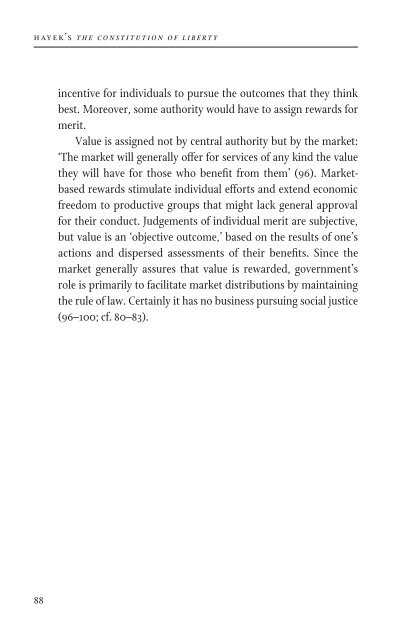Hayek's The Constitution of Liberty - Institute of Economic Affairs
Hayek's The Constitution of Liberty - Institute of Economic Affairs
Hayek's The Constitution of Liberty - Institute of Economic Affairs
Create successful ePaper yourself
Turn your PDF publications into a flip-book with our unique Google optimized e-Paper software.
h ay e k ’ s t h e c o n s t i t u t i o n o f l i b e r t y<br />
incentive for individuals to pursue the outcomes that they think<br />
best. Moreover, some authority would have to assign rewards for<br />
merit.<br />
Value is assigned not by central authority but by the market:<br />
‘<strong>The</strong> market will generally <strong>of</strong>fer for services <strong>of</strong> any kind the value<br />
they will have for those who benefit from them’ (96). Marketbased<br />
rewards stimulate individual efforts and extend economic<br />
freedom to productive groups that might lack general approval<br />
for their conduct. Judgements <strong>of</strong> individual merit are subjective,<br />
but value is an ‘objective outcome,’ based on the results <strong>of</strong> one’s<br />
actions and dispersed assessments <strong>of</strong> their benefits. Since the<br />
market generally assures that value is rewarded, government’s<br />
role is primarily to facilitate market distributions by maintaining<br />
the rule <strong>of</strong> law. Certainly it has no business pursuing social justice<br />
(96–100; cf. 80–83).<br />
5 MAJORITY RULE AND LIMITED<br />
GOVERNMENT (Chapters 7 and 10)<br />
<strong>The</strong> problem <strong>of</strong> reconciling liberalism with democracy is<br />
one <strong>of</strong> Hayek’s chief concerns in <strong>The</strong> <strong>Constitution</strong> <strong>of</strong> <strong>Liberty</strong>. <strong>The</strong><br />
problem is this: liberalism is a doctrine about human liberty or<br />
freedom and how to protect and extend it by setting limits to<br />
government. Democracy, as understood by many theorists and as<br />
<strong>of</strong>ten practised, subordinates liberty to the quest for equality. Can<br />
liberty flourish where the people are sovereign and the will <strong>of</strong> the<br />
majority prevails? Hayek turns now to the question <strong>of</strong> majority<br />
rule and its limits.<br />
Majority rule and the community<br />
Democratic government can be structured in different ways,<br />
and Hayek is quite vague here as to the kind <strong>of</strong> arrangement that<br />
he chiefly has in mind. <strong>The</strong> idea <strong>of</strong> majority rule presupposes<br />
some collectivity within which this rule takes place. Any group,<br />
<strong>of</strong> course, can entrust decision-making authority to a majority<br />
<strong>of</strong> its members; but not every group or collectivity is decisive for<br />
political life. Hayek has different ways <strong>of</strong> identifying the politically<br />
relevant group – state, country, society – but the one he settles on is<br />
‘the community.’ As we get deeper into <strong>The</strong> <strong>Constitution</strong> <strong>of</strong> <strong>Liberty</strong>,<br />
it becomes clear that Hayek assigns vast powers to the community<br />
and gives it a surprisingly important role in political life.<br />
88 89












